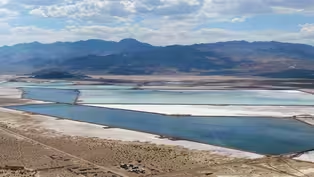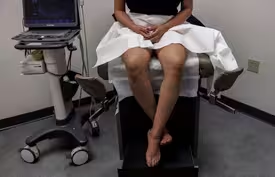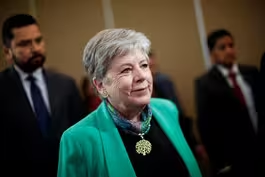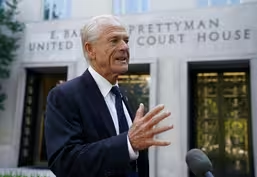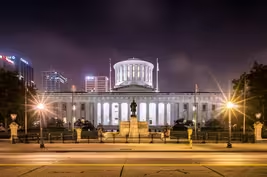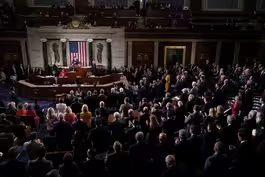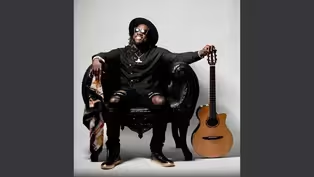
Border standoff intensifies as Texas governor defies ruling
Clip: 1/25/2024 | 5mVideo has Closed Captions
Border standoff between Texas, feds intensifies as governor defies Supreme Court ruling
This week, the Supreme Court sided with federal agents to remove razor wire put in place by Texas along the Rio Grande. The state is using wire and state agents to block Border Patrol from accessing a section of the border in Eagle Pass. Homeland Security is demanding access to the area by Friday, but Gov. Greg Abbott is doubling down. Laura Barrón-López discussed the dispute with Stephen Vladeck.
Problems playing video? | Closed Captioning Feedback
Problems playing video? | Closed Captioning Feedback
Major corporate funding for the PBS News Hour is provided by BDO, BNSF, Consumer Cellular, American Cruise Lines, and Raymond James. Funding for the PBS NewsHour Weekend is provided by...

Border standoff intensifies as Texas governor defies ruling
Clip: 1/25/2024 | 5mVideo has Closed Captions
This week, the Supreme Court sided with federal agents to remove razor wire put in place by Texas along the Rio Grande. The state is using wire and state agents to block Border Patrol from accessing a section of the border in Eagle Pass. Homeland Security is demanding access to the area by Friday, but Gov. Greg Abbott is doubling down. Laura Barrón-López discussed the dispute with Stephen Vladeck.
Problems playing video? | Closed Captioning Feedback
How to Watch PBS News Hour
PBS News Hour is available to stream on pbs.org and the free PBS App, available on iPhone, Apple TV, Android TV, Android smartphones, Amazon Fire TV, Amazon Fire Tablet, Roku, Samsung Smart TV, and Vizio.
Providing Support for PBS.org
Learn Moreabout PBS online sponsorshipAMNA NAWAZ: A standoff between federal Border Patrol and Texas state officials is intensifying following a Supreme Court ruling in favor of the Biden administration.
Laura Barron-Lopez has more.
LAURA BARRON-LOPEZ: Earlier this week, the Supreme Court said U.S. Border Patrol agents could remove razor wire that the state put in place along the Rio Grande River.
The Homeland Security Department is demanding immediate access to a section of the border and being blocked with razor wire and fencing.
But Texas Governor Greg Abbott is doubling down, blocking the agents from entering the area and saying Texas constitutional authority is -- quote -- "the supreme law of the land and supersedes any federal statutes to the contrary."
Joining me to discuss this further is Stephen Vladeck, a professor at the University of Texas School of Law.
Professor Vladeck, thanks so much for joining.
Republican Governor Abbott is saying Texas is going to hold the line.
And it's unclear when or if this razor wire is going to be removed.
Who ultimately has the authority over the border here?
STEPHEN VLADECK, University of Texas School of Law: Yes, I mean, I think it's pretty clear, under the Constitution, under our precedents, that immigration policy, control of the border really is ultimately in the federal government's purview.
But, Laura, I think it's just as clear that Governor Abbott wants this confrontation and that he's willing to take this battle all the way back to the Supreme Court before he's going to stand down.
LAURA BARRON-LOPEZ: And Governor Abbott is claiming that he has this authority under the U.S. Constitution because the federal government isn't protecting Texas against a -- quote -- "invasion."
That's the way he's been describing it.
Is this a reasonable interpretation of the Constitution?
STEVE VLADECK: No, and in two different respects.
I mean, the first is that, obviously, an influx of asylum seekers, however many we're talking about, is not what the founders had in mind when they used the word invasion.
But, Laura, second, even if you're not persuaded by that, the clause Governor Abbott's relying on in Article 1, Section 10 of the Constitution was dealing with the specific scenario of the ability of states to respond to invasions until federal authorities were able to respond.
This is the time in American history when the federal military was small.
It was very spread out.
It took weeks to travel.
Congress was usually out of session.
There's no support in our history, there's no support in founding or other materials for the idea that states can decide for themselves that they're under invasion, and, even if the federal government disagrees, that somehow it's the state's determination that would control.
LAURA BARRON-LOPEZ: Recently, three migrants drowned in the Rio Grande in this section that Border Patrol agents have been trying to access.
And all this comes as a number of Republican governors still say that they support Texas, that they stand by Texas.
What are the larger implications of this standoff between Texas and the federal government?
STEVE VLADECK: I mean, the larger implications are pretty staggering.
It's not just the specter of a physical confrontation between federal and Texas officials along the border in Eagle Pass.
It's also basically a relegation of a debate that we had in American law for the first 70 years of this country about the ability of states to effectively nullify those federal laws that they disagreed with, that they thought were unconstitutional.
For better or for worse in our constitutional system, federal law supersedes state law, even when we don't like how the federal government is or is not enforcing those federal laws.
The remedies for those disagreements are not to allow every state to go out on their own and to have their own policies.
The remedies, if you really have a problem with the policies, is to change the people who are making them.
Otherwise, it's a federal system, Laura, in name only.
LAURA BARRON-LOPEZ: And Governor Abbott also claims that the federal government has -- quote -- "broken the compact with states."
Where have -- what do you think he means by that?
And have states in the past used that language to justify defying the federal government?
STEVE VLADECK: Yes, I mean, the compact theory of the Constitution is a pretty outlier view, especially these days, about the way the Constitution was formed.
The basic premise is that the federal government, the constitutional system we have was formed by the states, and, therefore, the states can control its terms.
That was the argument on which the Southern states predicated secession and helped to precipitate the Civil War.
There's a reason why we tend not to hear that much of it these days.
Again, I mean, I think there's a lot of folks who are going to have strong views about whether the Biden administration is or isn't doing what's best for the country at the border.
But the way to air those disagreements is through the federal electoral process.
In a world in which states can follow this version of the compact theory as a justification for interfering with federal authority, what's to stop California from doing that to the next Republican president?
What's to stop Vermont from doing that to the next Republican president?
And then we're talking about a system in which the states have all the power, and the federal government is basically impotent to do anything.
LAURA BARRON-LOPEZ: Professor Stephen Vladeck of the University of Texas, thank you for your time.
STEVE VLADECK: Thank you.
Demand for lithium batteries could harm U.S. water resources
Video has Closed Captions
Clip: 1/25/2024 | 9m 38s | How demand for lithium batteries could drain America's water resources (9m 38s)
How abortion restrictions affect thousands of rape victims
Video has Closed Captions
Clip: 1/25/2024 | 5m 49s | Study estimates 64,000 pregnancies from rape in states that enacted abortion bans post-Roe (5m 49s)
Mexico's foreign secretary on steps to ease border crisis
Video has Closed Captions
Clip: 1/25/2024 | 7m 44s | Mexico's foreign secretary discusses what her country is doing to ease border crisis (7m 44s)
News Wrap: Peter Navarro sentenced for contempt of Congress
Video has Closed Captions
Clip: 1/25/2024 | 5m 13s | News Wrap: Former Trump adviser Peter Navarro sentenced to prison for contempt of Congress (5m 13s)
Ohio becomes latest state to restrict gender-affirming care
Video has Closed Captions
Clip: 1/25/2024 | 5m 53s | Ohio becomes latest state to restrict gender-affirming care for minors (5m 53s)
Possible deal on Ukraine, immigration at risk of collapsing
Video has Closed Captions
Clip: 1/25/2024 | 4m 38s | Possible deal on Ukraine aid, immigration reform at risk of collapsing (4m 38s)
SaulPaul uses his music to inspire and empower young people
Video has Closed Captions
Clip: 1/25/2024 | 3m 39s | How SaulPaul is using his music to inspire and empower young people (3m 39s)
Trump takes the stand in federal defamation case
Video has Closed Captions
Clip: 1/25/2024 | 4m 43s | What happened in court when Trump took the stand in federal defamation case (4m 43s)
Providing Support for PBS.org
Learn Moreabout PBS online sponsorship
- News and Public Affairs

FRONTLINE is investigative journalism that questions, explains and changes our world.

- News and Public Affairs

Amanpour and Company features conversations with leaders and decision makers.












Support for PBS provided by:
Major corporate funding for the PBS News Hour is provided by BDO, BNSF, Consumer Cellular, American Cruise Lines, and Raymond James. Funding for the PBS NewsHour Weekend is provided by...
